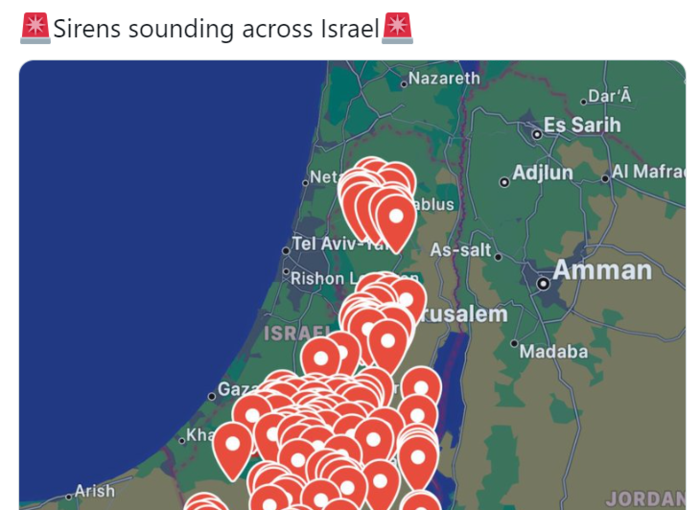An editorial in the Guardian’s sister site, The Observer, (“After Iran’s attack on Israel, further escalation must be stopped”, April 14), effectively took Iran’s side after the Islamist regime and its regional proxies fired over 300 rockets and drones at Israel overnight – an unprecedented assault which was denounced by the US, UK, EU and many other democracies. Not only did the US, Britain and France assist Israel in intercepting many of the drones heading to Israel, but even Jordan effectively came to Jerusalem’s defence, by reportedly shooting down drones that violated its airspace and were heading to Israel.
Though most of the projectiles were intercepted, damage was done to an IDF airbase in the south, and a 7 year-old girl from a Bedouin town near Arad underwent surgery for a head wound caused by shrapnel from an intercepted missile. The hundreds of incoming rockets and drones fired at dozens of cities triggered red alert sirens, sending Israelis all across the country into bomb shelters.
🚨Sirens sounding across Israel🚨 pic.twitter.com/BuDasagr10
— Israel Defense Forces (@IDF) April 13, 2024
The Observer warns against an overreaction by Israel’s “extremist coalition”, ignoring that the decision on whether to retaliate will be made solely by the war cabinet, which consists of Netanyahu, defence minister Yoav Gallant and Benny Gantz. The editorial also stresses that the Americans and Britain must “use all their persuasive powers and all available diplomatic means to try to moderate Israel’s reaction and stop further attacks by Iran”, before adding:
Amid the present tumult, it should not be forgotten that this Iranian attack was provoked, according to Iran’s leadership at least, by Israel’s unacknowledged bombing on 1 April of an Iranian embassy annex in Damascus that killed several senior commanders. In Tehran’s not unreasonable view, that attack crossed a red line by targeting diplomatic premises. For the Supreme Leader, Ayatollah Ali Khamenei, it amounted to an assault on sovereign Iranian territory. It could not go unanswered.
A complex spider’s web of calculation, ambiguity and hidden motives lies behind last night’s confrontation. Iran has sought to capitalise on the Gaza war, expanding its regional influence through proxy forces in Syria, Iraq, Yemen and Lebanon – the “axis of resistance”. While denying advance knowledge of the 7 October attacks, it has maintained support for Hamas and applauded Hezbollah’s ensuing bombardment of northern Israel. But it had avoided, until now, direct confrontation with Israel.
…
On this reading, the Damascus embassy attack was a deliberate escalation designed to fortify his political position, flush out Iran and draw the blind-sided Americans back to his side.
First, their assertion that the attack in Damascus struck “an Iranian embassy annex”, thus representing an attack on “sovereign Iranian territory”, is only a Iranian claim – one that not only has been disputed by Israel. A US State Department spokesperson stated, when asked about Tehran’s characterisation of the target hit by Israel, that “It is our position that we are still attempting to answer that question, whether it was a consular facility or not.”
Further, at least six of those killed were from the IRGC, Hezbollah and Syrian militias, or were known terrorists.
While Syria reportedly has refused to disclose the identity of seven others who died in the strike, there’s no evidence that they were diplomats or ordinary civilians. In fact, one of those killed in the strike on IRGC officials, Mohammad Reza Zahedi, was the commander of the IRGC-QF in Lebanon, plays a key role in in providing Iranian-made missiles to Hezbollah, was a member of Hezbpllah’s Shura Council and, according to Iranian sources, was personally involved in the planning and execution of the October 7th massacre.
Iran’s assertion, wrote Haaretz journalist Amos Harel, regarding “the building’s diplomatic status” is “aimed at laying the groundwork in the international arena for the Iranian case that the facility was under Iranian sovereignty, and tantamount to an attack on Iranian soil”. So, the Guardian, it seems. has allowed itself to be played by the Islamic Republic.
Moreover, though the editorial dances around this important fact in the second paragraph highlighted, Iran, through its proxies – such as Hezbollah, Hamas and the Houthis, groups which are part of Tehran’s so-called ‘Axis of Resistance’ – has been directly striking Israel nearly every day for the past six months.
Hamas carried out the deadliest attack on Israeli civilians in the country’s history, representing the worst antisemitic massacre since the Holocaust, while Hezbollah forces, and assorted other Iranian-backed militias, have bombarded Israeli cities with thousands of projectiles over the past six months – forcing the displacement of roughly 70,000 Israelis in the north, and killing nine civilians and 11 soldiers. If the mullahs wanted to, they could have of course prevented Hezbollah and its other proxies in the region from from entering the war.
As the writer Eli Lake responded to other Iran apologists who’ve peddled the Guardian/Iranian line about Israel knowingly provoking the regime: “Why is this argument never made in reverse? Hamas knew when it raped, mutilated and murdered 1200 Jews, it would provoke a retaliatory response. Iran knew when it armed, funded and trained genocidal proxies, it would provoke a retaliatory response.”
Even by Guardian standards, the editorial’s legitimisation of the Iranian narrative on their attack on Israel is astonishing.
Related Posts
The Guardian’s worst ‘journalist’ continues to protect Hamas






Well it would have to since Iranian and Qatari money is keeping the rag afloat
Israel’s enemies escalate, and it is for Israel to de-escalate, so say our betters. And they are very willing to rearrange the narrative in any way they must to assure that the parties are assigned their “proper roles” in the narrative.